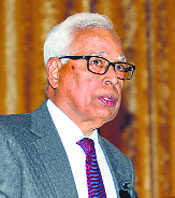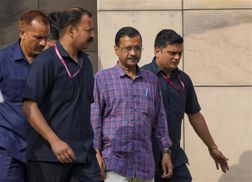
"Today, there is no important institution or activity which is not insecure. It has, thus, become extremely essential to safeguard almost every arena. — NN Vohra, J&K Governor
Tribune News Service
New Delhi, January 21
Advocating a new approach in managing the ever-increasing challenges to national security, Jammu and Kashmir Governor NN Vohra today suggested a three-pronged strategy — a National Security Policy, creation of a National Security Administrative Service and a Ministry of National Security Affairs.
“Today, there is no important institution or activity which is not insecure. It has, thus, become extremely essential to safeguard almost every arena and to particularly secure arrangements relating to food, water, energy, nuclear power, science and technology, environment, ecology, finance, business, commerce, banking, cyber space and other important quarters,” Governor Vohra said delivering the 12th RN Kao Memorial Lecture instituted by the Research and Analysis Wing, in honour of the founder of the country’s external intelligence agency.
(Follow The Tribune on Facebook; and Twitter @thetribunechd)
Drawing upon his vast administrative experience, he identified some of the structural deficiencies in the existing national security management systems and offered ways to address some of these, including the UK model of parliamentary oversight that examines the expenditure, administration and policies of intelligence services.
On the Centre-state equation, he said it is not easy to explain the Government of India’s approach, particularly in the context of the constitutional prescription that “it shall be the Union’s duty to protect the states against internal disturbances”.
Over the years, he said, tendency of the Centre was to avoid any confrontation with states, while rarely questioning the states about the root causes of disturbances even after extending assistance in the form of forces to restore normalcy.
Referring to the question on Centre’s constitutional responsibility after warning to the state in the Babri Masjid demolition case or concerns on actual capability of the Centre to deal with events like the Mumbai terror attack, he said it leads to imperative of having a well-considered National Security Policy (NSP), that is “founded in unambiguous Union-states understandings to work together for collectively safeguarding the country’s unity and territorial integrity”.
The draft NSP, he said, could be discussed at the Inter-State Council chaired by the Prime Minister and once states accept their responsibility to maintain internal security, there would be no reason why they should not become progressively capable of effectively dealing on their own with any arising internal disturbance.
Barring Jammu and Kashmir, where India is fighting Pakistan’s proxy war, Governor Vohra said the recurring deployment of the Army in other parts for dealing with local insurgencies and internal disturbances in states “has the rather worrying potential of blunting the Army’s operational efficiencies....”
Governor Vohra also said for effective maintenance of internal security, it is also essential to implement reforms and improvements in the entire framework of the criminal justice system, and clean up the system since there is also subsisting question mark on the integrity of the subordinate judicial services.
He also touched upon the need for comprehensive laws with pan-India jurisdictions to deal with terrorism, cyber crimes and economic offences and to tackle growing criminality by organised crime, drug trafficking and mafia groups many of which have close connections with terrorist organisations, both in the light of experience of the National Investigation Agency and the proposed National Counter-Terrorism Centre.



























